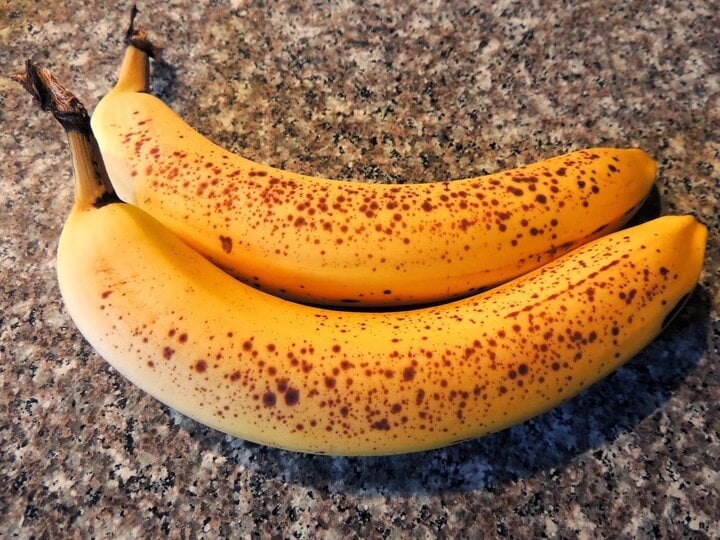Bananas are a quintessential example of delicious, nutritious, and affordable fruit. Everyone knows that this fruit is incredibly healthy and offers a plethora of health benefits. However, many people are unaware of what a safe banana should look like.
Are Bananas with Black Spots Safe to Eat?
Bananas go through various stages of ripeness, from green to yellow to spotted black. Each stage offers a unique flavor and nutritional profile. Black spots are typically an indication of natural ripening rather than spoilage.
So, the answer to the question, “Are bananas with black spots safe to eat?” is yes. The black spots on banana peels form due to the conversion of starch into sugar. As bananas ripen, the enzyme amylase breaks down starch into simple sugars, making the fruit sweeter and softer. The black spots appear when the banana cells start to break down, indicating that the banana is ripe and at its nutritional peak, offering both delicious taste and health benefits.

Ripe bananas with black spots offer numerous health benefits. (Photo: StockFood)
According to Dr. Upasana Sharma, Head of the Department of Clinical Nutrition at Max Hospital, Gurugram, “The black spots on banana peels represent TNF, a cancer-fighting substance that helps combat abnormal cells in the body. The more black spots, the higher the TNF content in the banana.”
Fully ripe bananas are rich in antioxidants, which boost the immune system to fight against viruses and cancer cells. Dr. Sharma explains, “As bananas ripen, the black spots increase, and so do their antioxidant properties. While they may not look appealing, they are highly nutritious. The riper the banana, the higher its immune-boosting properties.”
Bananas, especially those with black spots, are packed with essential nutrients such as vitamins A, B6, and C, magnesium, calcium, potassium, and fiber. In addition to their cancer-fighting properties, these spotted bananas have low sodium content and help regulate blood pressure.
Their benefits include stronger bones, anemia prevention, stress reduction, and quick energy boosts. Moreover, ripe bananas are good for the heart, combat depression, aid digestion, and promote healthy bowel movements.
Bananas with black spots are safe to consume and pose no health risks. However, if the banana emits an unpleasant odor, it has likely overripe and should be discarded.
A word of caution for diabetics: overripe bananas with higher sugar content can cause a spike in blood sugar levels, so it’s best to consume them in moderation.
Benefits of Eating Ripe Bananas
Gut Health: Ripe bananas reduce ulcer-causing acids in the stomach, protect the mucous membrane, and lower the risk of stomach ailments. They also contain protease inhibitors, which help eliminate harmful bacteria associated with gastric ulcer development.
Constipation Prevention: Ripe bananas with black spots are easier to digest, improving digestion and preventing constipation. The fiber in bananas helps eliminate waste from the intestines and stimulates bowel movements, enhancing overall digestion.
Stress and Anxiety Relief: Bananas contain tryptophan, essential for serotonin production in the body. Serotonin is a mood-enhancing neurotransmitter that helps reduce fatigue. Additionally, the potassium in bananas improves brain function by supplying more oxygen to the brain cells, while the vitamin B content helps maintain calmness and improve mood.
Acid Reflux Relief: Bananas have natural antacid properties that quickly relieve acid reflux and heartburn. Regular banana consumption helps neutralize stomach acids and can even eliminate acid reflux entirely.
Energy Boost: Potassium in bananas prevents muscle cramps, and the carbohydrates provide a substantial energy boost. Bananas release energy slowly, making them a superior choice for sustained energy compared to other sugary snacks.
Anemia Treatment: Bananas are rich in iron, which stimulates red blood cell and hemoglobin production, enhancing blood circulation to all body parts and treating anemia.
Antioxidant Properties: Ripe bananas with black spots are rich in antioxidants, protecting the body from free radicals and preventing various diseases, including cancer.
Immune System Boost: The vitamin C and antioxidant content in ripe bananas strengthen the immune system, safeguarding the body against pathogens.
Tips for Storing Ripe Bananas
Room Temperature Storage: Ripe bananas should be stored at room temperature, away from direct sunlight. If they become overripe, you can refrigerate them to slow down further ripening.
Avoid Airtight Containers: Do not store bananas in airtight plastic bags or containers, as this can increase moisture and lead to mold. Instead, keep them in a cool, dry, and well-ventilated area.
Regular Checks: Regularly check your bananas and remove any that have spoiled to prevent the spread of mold to the other bananas.
According to VTC News





































